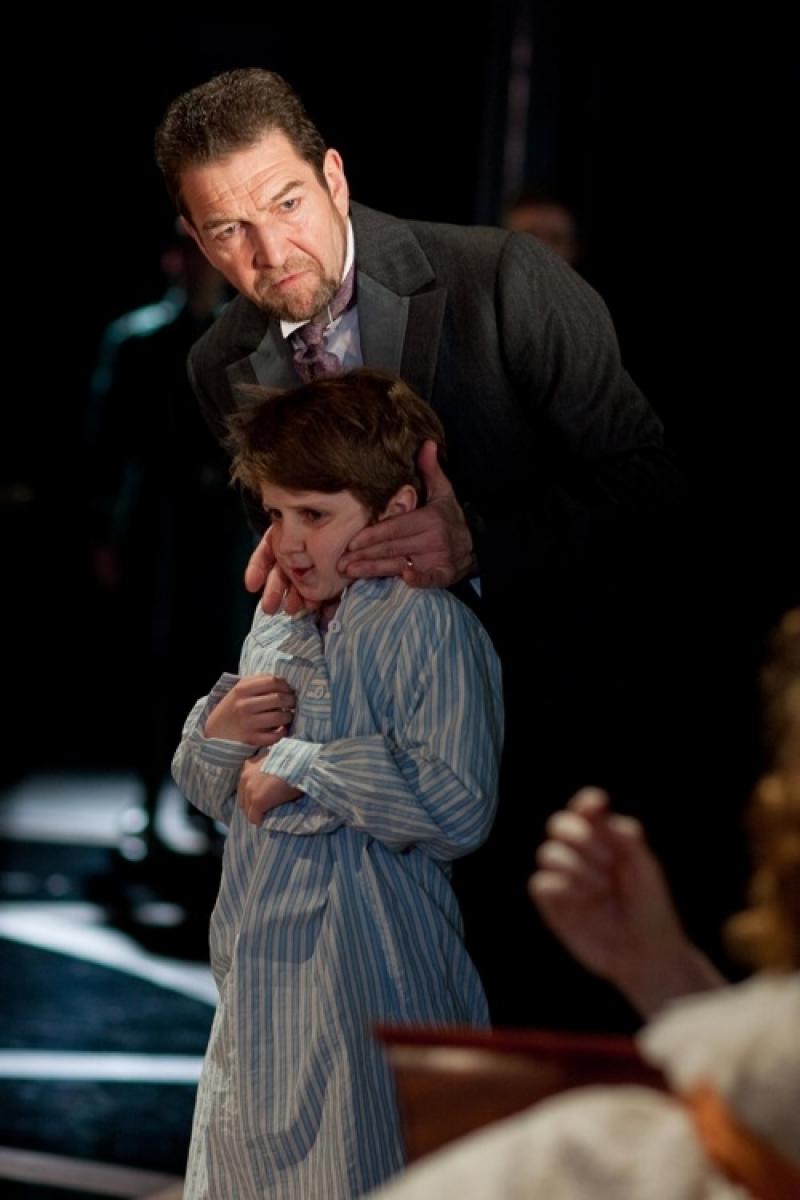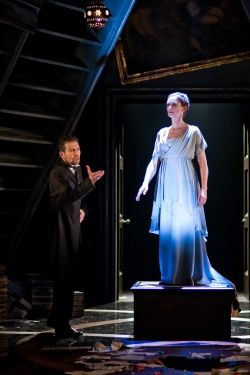The Winter's Tale, RSC/Roundhouse | reviews, news & interviews
The Winter's Tale, RSC/Roundhouse
The Winter's Tale, RSC/Roundhouse
Passions to warm the coldest night in this Shakespearean romance

A night when a fresh fall of snow was fluttering from the heavens could hardly have felt more fitting for the opening of this Shakespearean romance – particularly since David Farr’s production for the RSC, first seen in Stratford in 2009, so felicitously counters fire with ice.
Sicilia, under the chilly rule of Greg Hicks’s Leontes, is a state of discipline and military might. Two towering bookshelves laden with weighty tomes guard its central entrance on Jon Bausor’s imposing design, lit in smoky shafts by Jon Clark. Braided uniforms and dark formal frockcoats rub shoulders; this is an imposing, masculine environment, even at its most festive, where little princeling Mamillius himself wears a paper crown from a cracker and where the warm sensuality of Kelly Hunter’s Hermione is dangerously conspicuous. And yet, Hunter powerfully suggests, the attentions she pays to Darrell D’Silva’s Bohemian ruler Polixenes are in part, at least, performed out of a sense of duty. Alone with her women and her son, the heavily pregnant queen shows decided signs of strain. Ironically, it is in doing her utmost as her husband’s political and diplomatic helpmeet – as well as in her role as loyal wife – that she has undone herself.
Hicks’s self-inflicted torment is acute. Keith Clouston’s score fills his head with a high-pitched whining as his suspicions take possession of him, and we watch him struggle with his jealousy, desperately attempting to shake it off, then rebounding into tortured justification, his slender body taut with watchful paranoia. As for Hunter, she is magnificent in her dignity and anger when, falsely accused, she is dragged before the court in her soiled nightgown, bloodstained and still weak from childbirth. And Noma Dumezweni’s statuesque Paulina is furiously forceful without ever becoming shrill or histrionic.
 The thunderous collapse of the bookshelves plunges Sicilia into a papery blizzard of desolation; and, in Bohemia, the visual motif is maintained, with a giant paper bear puppet seeing off the hapless Antigonus, who here dies protecting baby Perdita, and a pastoral glade of trees with text-covered paper leaves. With the teenage Perdita and her lover, Prince Florizel, entwined among the branches, there’s a riotous satyr dance in which the performers, clad in ribbons of paper and huge scarlet-tipped phalluses, prance and whoop around the young couple. It’s a striking combination of the dionysiac and the English folk tradition of the maypole.
The thunderous collapse of the bookshelves plunges Sicilia into a papery blizzard of desolation; and, in Bohemia, the visual motif is maintained, with a giant paper bear puppet seeing off the hapless Antigonus, who here dies protecting baby Perdita, and a pastoral glade of trees with text-covered paper leaves. With the teenage Perdita and her lover, Prince Florizel, entwined among the branches, there’s a riotous satyr dance in which the performers, clad in ribbons of paper and huge scarlet-tipped phalluses, prance and whoop around the young couple. It’s a striking combination of the dionysiac and the English folk tradition of the maypole.
The rustics at this pheromone-charged feast are faintly cod, though there’s an entertaining turn from Brian Doherty as the rogue Autolycus, a boozy, rough-sleeping petty crim in tatty raincoat and prison-issue longjohns, rollie dangling from his lip. But it’s only when we’re back in Sicilia, for the strangest and most shattering of family reunions, that Farr’s production reasserts its compulsion. Dumezweni’s Paulina manages the scene of revelation that she has secretly contrived (pictured above right) – when the agonised Leontes is confronted with what he believes to be a statue of Hermione, only to see her come back to life before his wondering gaze – with beautiful compassion and delicacy. And the reconnecting of Hunter and Hicks – as well as Hunter’s tremulous meeting with her grown-up daughter – are tentative, and then flooded with emotion.
Only for Autolycus – excluded from the celebrations and left, in the final stage image, outside in the dark beneath the falling snow – does the cruelly biting cold that whistles through the tragic scenes persist. A reminder, perhaps, that even under its reformed ruler, Sicilia can still be a pitiless place. Still, the emotional resolution is not so undercut that it does not leave a lasting glow. It should warm the coldest winter’s night.
- The Winter’s Tale in rep at the Roundhouse until 1 January, 2011
- See what’s on at the RSC this year
Explore topics
Share this article
The future of Arts Journalism
You can stop theartsdesk.com closing!
We urgently need financing to survive. Our fundraising drive has thus far raised £33,000 but we need to reach £100,000 or we will be forced to close. Please contribute here: https://gofund.me/c3f6033d
And if you can forward this information to anyone who might assist, we’d be grateful.

Subscribe to theartsdesk.com
Thank you for continuing to read our work on theartsdesk.com. For unlimited access to every article in its entirety, including our archive of more than 15,000 pieces, we're asking for £5 per month or £40 per year. We feel it's a very good deal, and hope you do too.
To take a subscription now simply click here.
And if you're looking for that extra gift for a friend or family member, why not treat them to a theartsdesk.com gift subscription?
more Theatre
 Edward II, RSC, Swan Theatre, Stratford review - monarchs, murder and mayhem from Marlowe
Putsch in the palace brings down a king who chose the wrong person to love
Edward II, RSC, Swan Theatre, Stratford review - monarchs, murder and mayhem from Marlowe
Putsch in the palace brings down a king who chose the wrong person to love
 One Day When We Were Young, Park Theatre review - mini-marvel with a poignant punch
Perfectly judged performances enhance a subtle staging of Nick Payne's two-hander
One Day When We Were Young, Park Theatre review - mini-marvel with a poignant punch
Perfectly judged performances enhance a subtle staging of Nick Payne's two-hander
 Alterations, National Theatre review - high emotional costs of ambition
The Guyanese migrant experience of 1970s London gets the big-stage treatment
Alterations, National Theatre review - high emotional costs of ambition
The Guyanese migrant experience of 1970s London gets the big-stage treatment
 A Knock on the Roof, Royal Court review - poignant account of living under terror
Gaza play is both surreally humorous and finally devastating
A Knock on the Roof, Royal Court review - poignant account of living under terror
Gaza play is both surreally humorous and finally devastating
 The Score, Theatre Royal Haymarket review - curious beast of a play fails to engage
Missed opportunity to create a rich drama from this intriguing historical encounter
The Score, Theatre Royal Haymarket review - curious beast of a play fails to engage
Missed opportunity to create a rich drama from this intriguing historical encounter
 The Ferryman, Gaiety Theatre, Dublin review - Jez Butterworth's Northern Irish epic comes close to home
Variable ensemble yields some gripping scenes and monologues
The Ferryman, Gaiety Theatre, Dublin review - Jez Butterworth's Northern Irish epic comes close to home
Variable ensemble yields some gripping scenes and monologues
 Backstroke, Donmar Warehouse review - a complex journey through a mother-daughter relationship
Tamsin Greig and Celia Imrie shine in a multifaceted portrait of motherhood
Backstroke, Donmar Warehouse review - a complex journey through a mother-daughter relationship
Tamsin Greig and Celia Imrie shine in a multifaceted portrait of motherhood
 Richard II, Bridge Theatre review - handsomely mounted, emotionally muted
Jonathan Bailey makes a petulant stage return in Shakespeare's most luxuriant play
Richard II, Bridge Theatre review - handsomely mounted, emotionally muted
Jonathan Bailey makes a petulant stage return in Shakespeare's most luxuriant play
 Otherland, Almeida Theatre review - a vivid, beautifully written take on the trans experience
Bush's writing is as fresh as a sea breeze and as lyrical as birdsong
Otherland, Almeida Theatre review - a vivid, beautifully written take on the trans experience
Bush's writing is as fresh as a sea breeze and as lyrical as birdsong
 Much Ado About Nothing, Theatre Royal Drury Lane review - this shamelessly hedonistic production is a triumph
Diamond-sharp banter and an endorphin fizz make this one of the best parties in town
Much Ado About Nothing, Theatre Royal Drury Lane review - this shamelessly hedonistic production is a triumph
Diamond-sharp banter and an endorphin fizz make this one of the best parties in town
 Hamlet, Royal Shakespeare Theatre - Luke Thallon triumphs as the state succumbs to storms
The iceberg cometh
Hamlet, Royal Shakespeare Theatre - Luke Thallon triumphs as the state succumbs to storms
The iceberg cometh
 East Is South, Hampstead Theatre review - bewildering and unconvincing
House of Cards writer tackles AI and religion, but without the necessary clarity
East Is South, Hampstead Theatre review - bewildering and unconvincing
House of Cards writer tackles AI and religion, but without the necessary clarity

Add comment